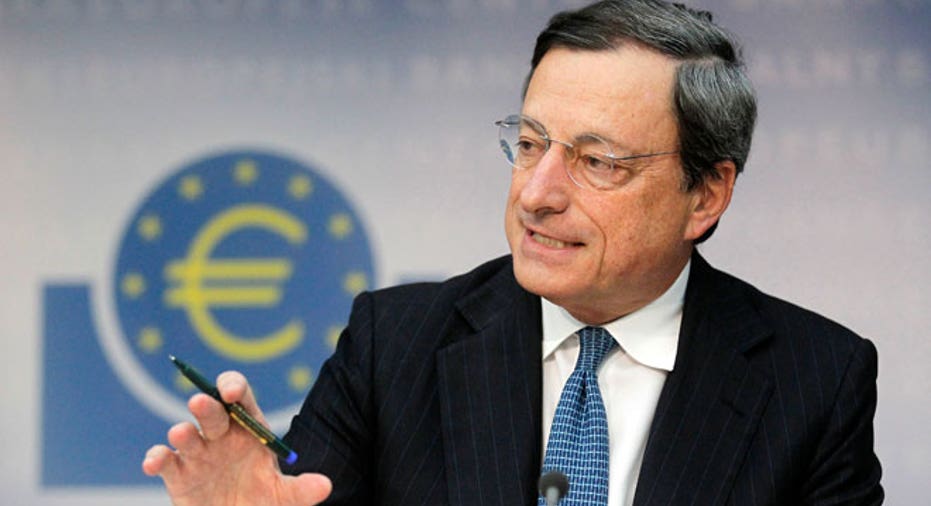ECB's Draghi Has No One to Blame But Himself

Mario Draghi has no one to blame but himself for the widespread disappointment Thursday with the European Central Bank for failing to roll out a blockbuster plan to address the eurozone debt crisis.
After all, it was Draghi himself who promised just such a plan a week ago.
Global markets tanked on Draghi’s announcement that the ECB, over which he presides as president, “may undertake outright open market operations of a size adequate to reach its objective.”
That vague, jargony, central banker-speak stands in stark contrast to his comments made a week ago in London when he promised that the ECB would do “whatever it takes” to rescue the single-currency eurozone from dissolving under the weight of the two-year-old crisis. “And believe me, it will be enough,” Draghi added for emphasis.
It wasn’t nearly enough.
In the U.S., the Dow Jones Industrial Average was down 153.14, or 1.18%, at 12,817.92 in midday trading. European markets were similarly off following Draghi’s comments, made in Frankfurt at the conclusion of an ECB meeting widely expected to yield tangible results.
Instead, the ECB did nothing while promising to take some undefined action at some undetermined future point, action that would ostensibly lower borrowing costs for debt-addled countries such as Spain and Italy.
“Once again, we have no commitment to action from the ECB, and no execution of promises previously made. Nothing seems set to happen now,” said Carl Weinberg, chief economist at High Frequency Economics, in a widely disseminated note to clients.
In comments clearly shared by many, Weinberg added, “Traders and investors who expected immediate action are, and should be, disappointed. More scolding of governments, but no ECB action, is the bottom line.”
It’s hardly the first time markets have been disappointed by inaction by the ECB. For months, analysts have criticized Europe’s fiscal leaders for their seemingly feckless approach to a crisis that has broad global implications.
If Spain and Italy are forced to default on their debts because they aren’t raising enough revenue on their own and can no longer afford to borrow, the contagion would ripple across Europe and have a devastating impact on every country and banking institution that holds Spanish and Italian debt.
Spanish and Italian bond yields are currently both well over 6%, or just a shade below the 7% level at which Portugal, Greece and Ireland could no longer borrow because the costs were too high, forcing bailout packages.
The viability of the 17-member eurozone is contingent on healthy credit markets. Yet the ECB’s strategy has been piecemeal from the outset of the crisis, lurching from one brush fire to the next but never really addressing the larger causes.
More of the same from Draghi
Draghi’s strongly worded statement a week ago had kindled hopes that European fiscal leaders were finally taking a broad-based approach to the credit crisis, and no longer simply throwing money at Greece or Italy in an effort to stave off default for another couple of months.
Instead, the ECB announced nothing new.
Specifically, the ECB failed to initiate a massive program of bond purchases similar to that undertaken in the U.S. at the height of the recent financial crisis. Quantitative easing, as the practice is known, helps pump liquidity into clogged credit markets.
In addition, the ECB left its main interest rate steady at 0.75%, a historic low in Europe but still well above the 0%-0.25% range put in place by the U.S. Federal Reserve nearly four years ago.
Compounding matters, at least from the point of view of Draghi’s critics, is that after promising the moon, the ECB president fell back into a long-held default mode in which he admonished countries that have buried themselves in debt to take the initiative and dig themselves out.
Draghi was crystal clear on Thursday that the onus remains on individual eurozone countries to get their financial houses in order by adhering to austerity measure and, if they choose, tapping into Europe’s rescue fund, the European Financial Stability Facility.
That has essentially been Germany’s message from the advent of the crisis, and it doesn’t go over well in many areas of Europe, particularly those hard hit by austerity measures ordered by the ECB as conditions for earlier rescue packages. Notably, in Ireland and Greece.
“The ECB is looking to keep the pressure on governments and eurozone policymakers to act by stressing that for risk premia in the bond markets to disappear, fundamental progress must be made on fiscal consolidation, structural reforms and building eurozone institutions. However, the ECB acknowledges that this takes time which markets are not willing to give, so that action is needed to eradicate risk premia and bring down bond yields for stressed countries,” said IHS Global Insight’s chief European and UK economist Howard Archer.
That’s undoubtedly a sensible approach, but one articulated countless times in the past two years by Draghi and other European fiscal leaders. The markets were looking for something very different on Thursday but what they got was more of the same.



















